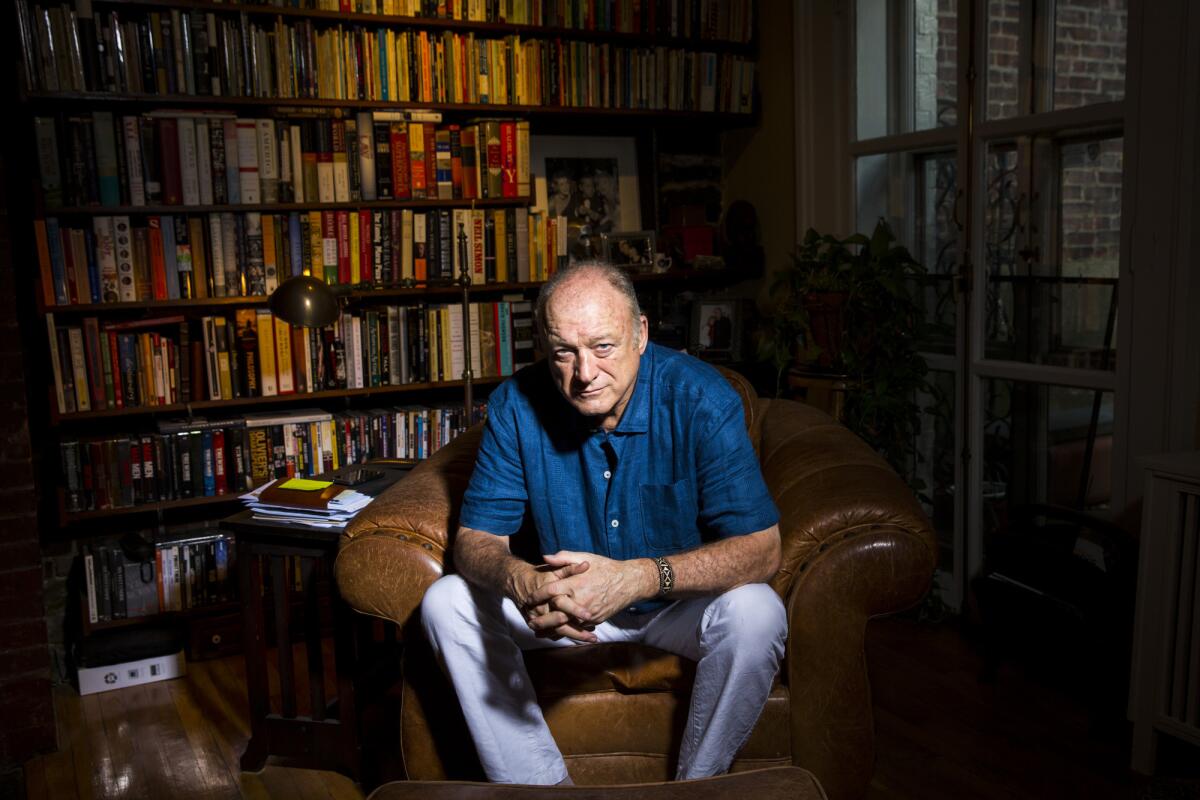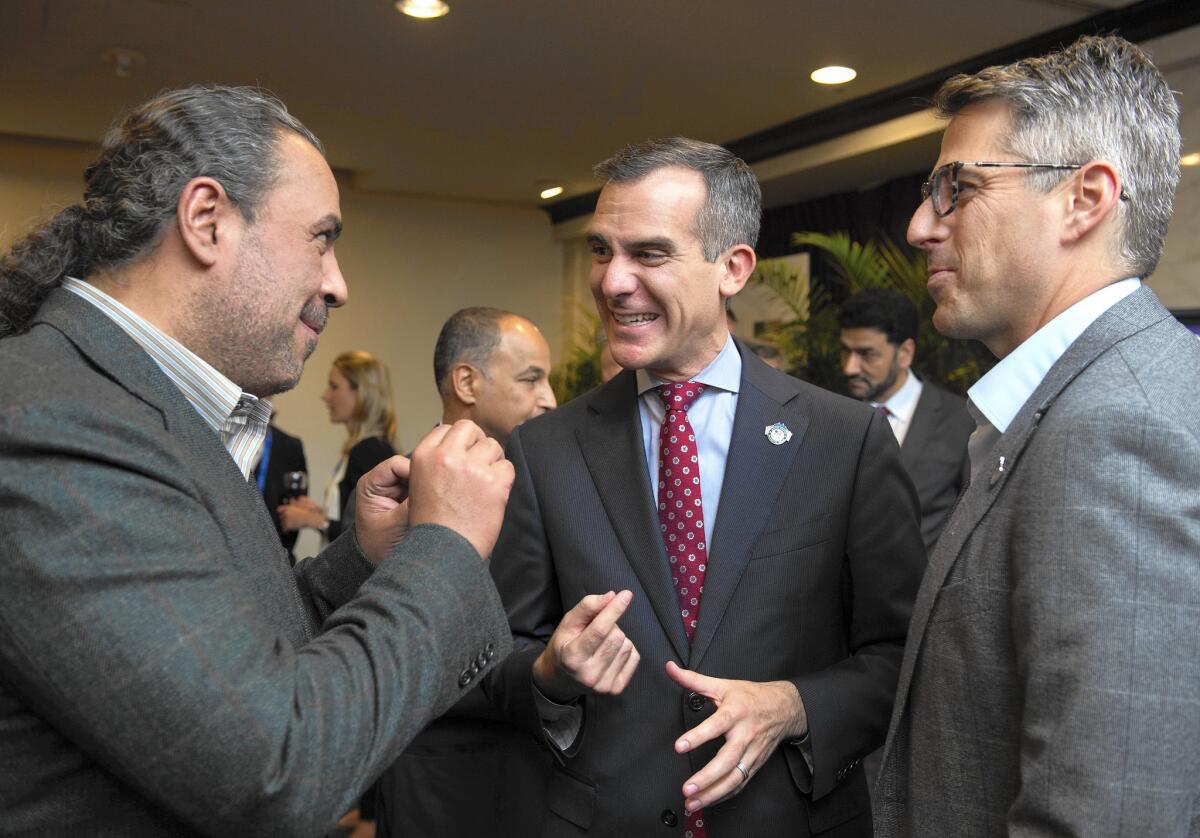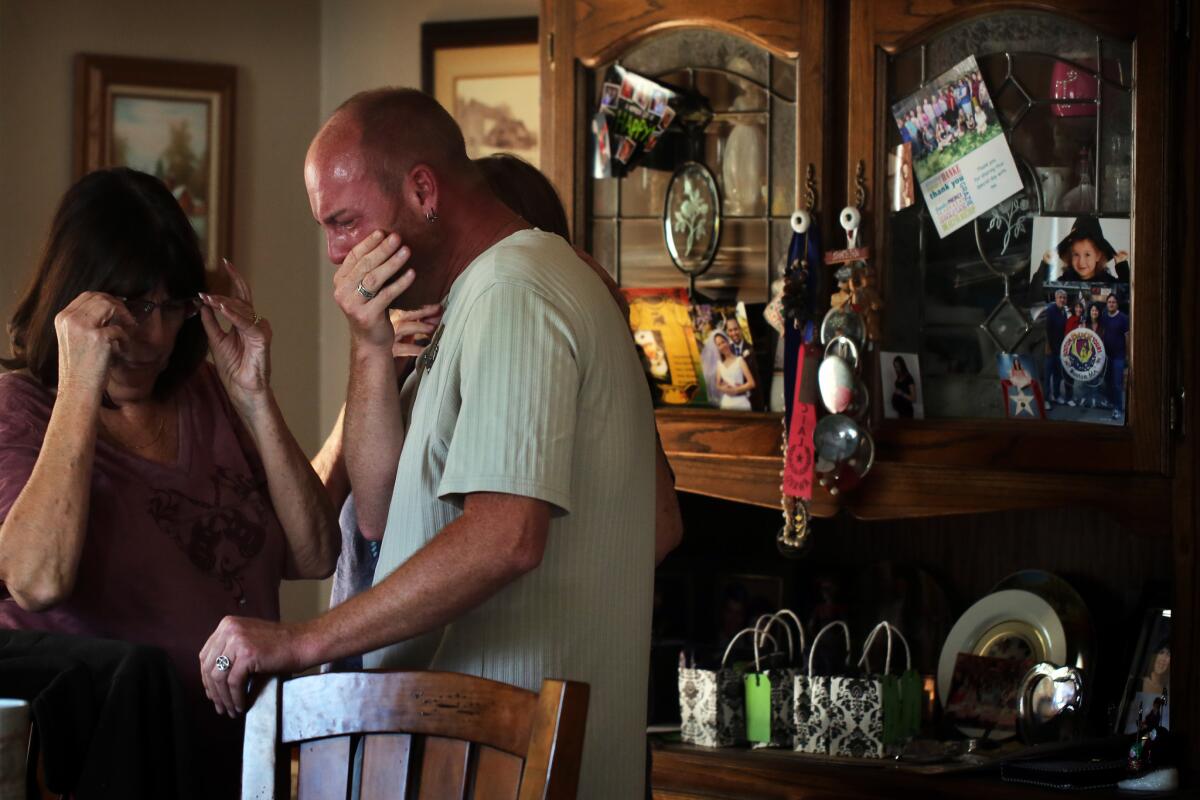Newsletter: Great Reads: Martin Amis and Stevie Wonder and life in an L.A. canyon
- Share via
Hey there. I'm Kari Howard, and I edit the Great Reads (a.k.a. Column Ones) for the Los Angeles Times.
Two of my biggest loves are narrative journalism and music, and I'm lucky that my days are filled with both: When reading the stories, I get inspired by songs I think fit the article's theme — a soundtrack.
Here are some of the past week's Great Reads (and lowercase great reads), plus their soundtracks.
Selling stardom on the fringes of the Hollywood dream
I'm not crazy about the word "underbelly," both because it creeps me out (don't get me going on soft underbelly) and it's overused, but I think it clearly fits Daniel Miller's series "Selling Stardom." Daniel has spent months reporting on the fringes of Hollywood, on the droves of people who want to make it big and probably never will, and the droves of people who will take their money and make them believe they actually can. Many talent agencies, of course, are completely above-board, but others take advantage of wannabe stars' dreams. If you haven't read the first installment of the series, you must. It focuses on talent agent Lynn Venturella, who has left a trail of unhappy clients. Love this bit: In an interview Venturella vacillated between contrition and jocularity. At one point, she said she would only discuss her clients in detail if a reporter agreed to coauthor a book with her that she'd title “Bad Agent.” “I would make it more juicy than it actually is,” Venturella said. “I would like it to be more fiction. I'd make the bad worse.”
Actor John Doman, who starred in HBO's "The Wire," at home in Brooklyn, N.Y. Talent agent Peter Strain pleaded guilty to a felony charge in connection with the theft of earnings from Doman and two other clients. (Jay L. Clendenin / Los Angeles Times)
The soundtrack: "I Wanna Be a Star," by the Mamas and the Papas. This isn't a great song, and it lacks their usual lovely harmonies, but it has a few fun couplets: "Mr. Director, please don't reject her," and "Mr. Producer, please don't seduce her."
The "Kosher Kennedy" and his fight to bring the Olympics back to L.A.
Anyone who knows Hollywood lore at all can picture studio mogul Lew Wasserman and his giant black-rimmed glasses. I love that his grandson, Casey Wasserman, keeps them in a glass case behind his desk. They're a symbol of what his family has given the man who is fighting to bring the 2024 Summer Olympics to Los Angeles. The man whom GQ magazine once dubbed the "kosher Kennedy" credits his grandfather with teaching him to "anticipate." "Can't be too prepared," he says. "That drives me every day." But as he made a name for himself in the sports management world, he wanted to prove he wasn't just cashing in on his famous name. And unlike his mercurial grandfather, "Casey's quiet about how he handles things," says Antonio Villaraigosa, the former Los Angeles mayor. "But he can be assertive when he needs to be."
ANOC President Sheikh Ahmad Al-Fahad Al-Sabah, left, speaks with Casey Wasserman, right, and Los Angeles Mayor Mayor Eric Garcetti, at the reception before the XX ANOC General Assembly 2015 on Oct. 27 in Washington, D.C. (Molly Riley / Getty Images for ANOC)
The soundtrack: "Carrying a Torch," by Van Morrison. OK, so this is a different type of torch from the Olympic one, but anytime I can listen to Van, I'm happy. I'm afraid that this is one of his lesser songs — it's no "Into the Mystic" (no matter how many times I hear that one, I get goosebumps when he sings, "I wanna rock your Gypsy soul").
This is what a great newsroom does, even as hearts break at the news
The Times' coverage of the San Bernardino shootings isn't a traditional Great Read. But the stories — dozens of them — have moved even as they informed. Take, for instance, the Alan Zarembo story of a man who learns that his boyfriend is among the dead after 22 hours of waiting and hoping. The last line is haunting: They wept together as the television news of the shooting played in the background. (The accompanying photo by Rick Loomis is wrenching.) Or this one by Marisa Gerber on a San Bernardino County worker who lost three friends. She says, “I just keep going through it my head and picturing where they’re supposed to be — at their desk. They’re not there and they won’t be.” Or this column by Robin Abcarian from a gun shop called Get Loaded, where customers are stocking up in the wake of the carnage. It's not preachy — she just lets the gun owners talk.
Ryan Reyes, center, breaks down after finding out his boyfriend of nearly three years, Daniel Kaufman, was one of those killed during Wednesday's mass shooting at the Inland Regional Center. (Rick Loomis / Los Angeles Times)
The soundtrack: "Line of Fire," by Junip. This song has melodic echoes of "This Is Not America," that great old Pat Metheny and David Bowie song. Which also might fit the story — I wish this weren't America, the land where mass shootings have become the everyday.
What I'm reading online
I'll read most things by Martin Amis, one of my favorite writers (for his terrible cleverness, especially). So when I saw that the New Yorker had a short story by him inspired by the Syrian refugee crisis in Europe, my finger went "click." It had his usual verbal dexterity: And even now it was as if a tectonic force had taken hold of Europe and, using its fingernails, had lifted it up and tilted it, politically, causing a heavy mudslide in the direction of old illusions, old dreams of purity and cruelty. And I found his use of the letters from Vladimir Nabokov to his wife, Vera, a couple who were refugees three times over, an effective leitmotif. But the veneer of fiction was whisper thin, and I found myself wishing it were either straight nonfiction or more purely fiction.
What's on my bedside table
The 1948 novel "Wind in the Canyon," by Edith Fox, is set in the canyon where I live. So I can overlook that it's a fairly slight romance, kind of a rustic '40s Harlequin. And that the inside jacket blurb starts, "In a day when fiction has become ultra modern with raw and ugly sophistication, WIND IN THE CANYON is like a breath of fresh air — fresh and invigorating." Oh, OK, and that the first page has a line like this: "Dee threw down her pruning shears, rose, and stretched her lean sturdy body, revealing firm high breasts that needed no buckled brassiere." Because this book describes the place I love most in L.A., and it's the same place now it was nearly 70 years ago, a "shelf-of-the-mountains that looks down so complacently on the steeple tower of Los Angeles city hall." And still feels a million miles away.
What's on my turntable
Although I spend most of my time listening with headphones to Spotify, sometimes I want to hear the needle touching down on vinyl. That's why I have a turntable in my office — and two at home (one inside, and a battery-powered one outside when the weather's fine — which it usually is in Southern California). This week's vinyl: "Songs in the Key of Life," by Stevie Wonder. I bought this double album for a dollar each on both coasts, and failed to check in either thrift store that it had both albums. What are the odds that both would be missing sides one and four? (In a quirk, one album has sides one and four, and the other — by my powers of deduction — has two and three.) So I don't get "Sir Duke," but at least I have "Pastime Paradise."
Want to chat? Have a great idea for a Great Read? I'm @karihow on Twitter and kari.howard@latimes.com on email.


